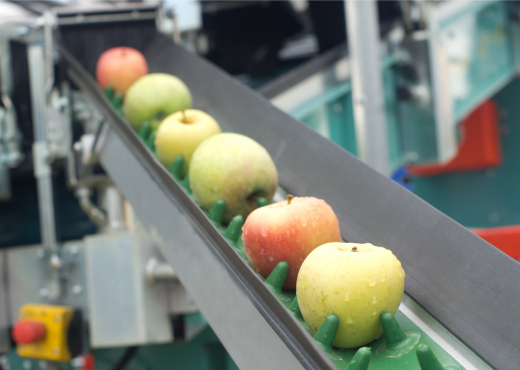Manufacturing in the food and beverage industry comes with its own host of challenges. Creating a safe and efficient work environment that simultaneously complies with food production laws can be a challenge. Moreover, having appropriate risk-management policies and practices in place should you discover an issue with a batch of product can be the difference between a company that survives and one that fails. We have a long-standing history of working with entities in the food manufacturing environment and helping them scale up and evolve their processes, or, if the market changes, helping them pivot or scale down. This history in the industry provides us with valuable insight and permits us to be proactive in identifying client needs and helping clients craft efficient and cost-effective solutions.

Entity Formation: The "Start" in "Startup"
You know you need to form an entity, but which one is right for you? B-Corporations, C-Corporations, S-Corporations, and limited liability companies (LLCs) carry widely differing tax consequences, and each has its own complexities. While you might not notice much difference during the very early stages of your business, the relative merits will become more evident once your business begins to see profits and pay taxes. Which entity is the right one for your business depends on individual circumstances; experienced legal counsel will consider the goals of your business and will assist you in choosing an option that is likely to be beneficial in the long run. The good news is you don't have to make all these decisions on your own. Members of our corporate team are here to help! In addition to answering formation questions, they can provide you with the tools to help keep good organizational records and can offer suggestions on how to go about having a discussion with others involved in your business about the terms of your business relationship—an essential discussion if you are making the move from hobbyist to professional.
Trademarks: Protecting the Secret Sauce
How patrons make the decision to go to your restaurant begins with brand recognition and trademarks. Trademarks include words, symbols, names, designs, logos, and any other devices that identify and distinguish your product from those of others. Company names, logo designs, taglines, product names, label designs, and packaging designs are all examples of trademarks. Trademarks help prevent confusion within the marketplace and function as source identifiers, allowing the world to distinguish a particular seller's products from those offered by others. Early investment in your brand saves money in the long run. The cost of changing your name and brand strategy after a few years in business, litigating a trademark infringement suit, or negotiating coexistence with a third party will far exceed the cost of assessing and securing trademark protection at the outset. Trademarks are all about assuring consumers that they can find quality and consistency under your brand. Entities should think about trademarks early and often in order to:
- Make sure they can use heir trademarks without stepping on another company's toes
- Select trademarks that are distinctive enough to actually enforce and protect
- Secure the appropriate rights in their trademarks
Our team of attorneys at Verrill routinely engage in initial consultations with new and existing businesses, free of charge, to develop a plan to establish and protect their brand.
Financing and Fundraising: Finding Fuel for the Business
Giving thought to how your business will raise capital to provide for its ongoing operations is critically important. The costs of space, equipment, and possible packaging for your product will exist before you make your first dollar. Consider each of the four common financing options that will work best for your business: bootstrapping, non-dilutive fundraising, bank loans, and securities offerings. Our team has expansive experience with each funding option and can guide you in making the decision that will best serve your organization.
Leasing and Real Estate: Getting out of the Kitchen
Your manufacturing location needs to be somewhere you can easily get products to market, and is crucial to success. Additionally, if you have growth plans in mind, making sure your location can appropriately accommodate those plans is essential. Commercial space can be extremely competitive. Most commonly, individuals lease space in an existing building, which requires a commercial lease that sets forth the terms of how the space will be used, the length of time of the lease, the amount paid each month, and the relationship between you and your landlord. A well-negotiated lease that is mindful of your current and future business needs will contribute to the success of your company. We always recommend you reach out to an attorney before finalizing your commercial lease or purchase and sale agreement. Our Real Estate Practice Group can work with you to navigate these terms and positively impact your lease negotiations.
Engaging with Employees: Of the People, by the People, for the People
Make a good choice, and you're likely to produce a good product. However, hiring and employing individuals is an aspect of operating a business that includes multiple minefields. While companies in the food and beverage industry, like other organizations, experience employment issues, the understanding of company culture becomes key to analyzing how to minimize risk while simultaneously maintaining the organization's culture. From hiring to onboarding, and from discipline to termination, the employment relationship is regulated not only at the state level, but also at the federal level, and when those regulations intersect with company culture, relationship management can sometimes be difficult. Our team has worked for decades with companies in the food manufacturing environment and know that importance of providing guidance and advice that directly takes the company's culture into account.
Safety Practices to Avoid/Reduce Workplace Injuries: A Watched Pot Never Boils
The best ways to avoid injuries in the workplace are to incorporate safety training in the onboarding process, reward safe behaviors, and reinforce safety requirements on a regular basis. Training your employees to clean up spills immediately, avoid obvious safety hazards, and move about the workplace in a safe manner can eliminate most unexpected hazards and drastically reduce work-related injuries. Workplace safety is governed by both state and federal laws including workers' compensation law and OSHA, so cultivating a culture of safety can result in savings and avoidance of unexpected audits or fines. Additionally, maintaining an injury-free workplace will result in savings on insurance premiums and bettering of the bottom line; plus, keeping employees safe should always be a priority. Our team of OSHA and Workers' Compensation attorneys is skilled in issue spotting and in helping clients proactively identify and correct workplace hazards that could have safety implications for the company.
Promotions: Advertising, Promotions, and Marketing
Is there more that you can be doing to market your product and expand the geographic reach of your consumer base? What's the best way to reach these individuals, and are there any limitations or regulations as to how you can go about making that contact? Are there laws that affect how you advertise the product or service? What are the limitations on how you can entice individuals to choose your company over others? If you aren't asking yourself these questions, you should be. Verrill has a prominent national practice in sales promotion law, having assisted marketing agencies and popular consumer brands for over 30 years. Our Chair of this department, Rob Laplaca, speaks regularly at promotion marketing events and publishes articles on promotion law. We offer legal services on a wide range of sales promotions, including sweepstakes and contests, charitable sales promotions, and premium offers.
Litigation and Risk Management: Keep Your Hard Work from Becoming Toast
You're about to embark on your dream of introducing your unique spin on a local delicacy to the public, having spent hours in the test kitchen perfecting the recipe. Everyone who's tried it loves it, and begs you for the secret ingredient. It's destined to be a success. But before you cash in that 401(k), invest your life savings to fulfill your life's dreams, hopes and desires, and walk away from that steady-paycheck, 9-to-5 gig, you want to make sure you can take that recipe from the test kitchen to the public and turn your vision into a profitable business. While there are a number of factors that determine whether your twist on a popular dish is a success, knowing and managing the risk from day one can help avoid pitfalls that can turn a dream into a nightmare. There are many risks in what happens in and out of a professional kitchen. Maybe you are getting ready for the weekend when you learn the Friday afternoon delivery of ingredients was spoiled. No business owner wants these headaches, but the question is whether you have positioned yourself to operate through the headache and flourish on the other side. An existing crisis is the worst time to find out that your insurance is inadequate or that you need a lawyer. We have a team approach to risk management, working closely with insurance agents and accountants to help make sure that you have prepared your company for worse-case scenarios.
Litigation: Don’t Let Hot Water Force You to Boil Over
You've worked hard to build your brand, and you product is moving at a rate that is tremendously better than you expected. You finally get a minute to check your email, and there is one from an enthusiast attaching a link to a company in Idaho with the same name as yours—selling a similar (but not identical) product. Even worse, you get a letter from the other company's attorney with a bunch of legalese telling you to immediately stop using the brand you've been building for years. Or what about the moment when you flip the switch for the new machine you purchased that will increase operating efficiency (but which cost you thousands) and find out there are defects throughout the equipment? The bank is going to be looking for loan payments even if you aren't creating and selling product. Our litigators are members of the firm's Food & Beverage Group not only because they love the products that companies are producing, but also so that if calamity arises, you have a team of familiar faces who have knowledge of your operation and are ready to spring into action.
Opportunities Abroad: Opportunities Abound Overseas
Think big! When building your business plan, remember the market for your product is now worldwide. Doing business in New England means that you have easy access to markets in the Northeastern U.S. and Canada. But did you know that you also have easy access to markets in Northern Europe? Many companies find themselves with big problems when trying to do business overseas. Often those problems could have been avoided if the owners of the companies had considered the international implications in their business plans at the outset. Here are some things to think about as you plan the growth of your company. Even if you don't think you will ever sell overseas, it makes sense to consider these questions at the outset. Many companies are surprised to receive orders for products from foreign countries as soon as those products become available online. A little thought at the outset can save you headaches in the future.
Buying and Selling: With Growth Comes Opportunity
Verrill's Mergers & Acquisitions attorneys bring a high level of sophistication, a broad range of experience, and an appreciation for the practical to each transaction they handle. Most recently, our team has handled the following food- and beverage-based deals:
- Represented Oakhurst Dairy in its sale to Dairy Farmers of America, Inc.
- Represented one of the largest fresh juice producers in the U.S. in obtaining venture capital and subsequently merging with its largest competitor, with an eye toward eventually selling the combined business. The combined business was later sold to a Fortune 50 company.
- Represented on a continuing basis the largest producer of wild blueberries in the world in connection with various acquisitions in the U.S. and Canada.
- Represented a large Japanese food conglomerate in connection with its acquisition of a U.S. fish processor.
- Represented a Massachusetts-based seafood wholesaler in connection with its acquisition of a Georgia fish processor.
Most of the Mergers & Acquisition group’s lawyers joined Verrill after practicing law at larger firms in New York, Boston, and other commercial centers, and all of our senior attorneys have learned their craft working on highly complex and high-priced deals over many years. That experience allows us to understand how to appropriately staff a deal of any size with the proper team, always with a lead partner remaining involved in all critical decision-making, in order to stay on time and on budget while billing at highly competitive rates.











